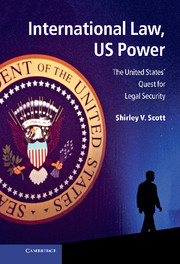Book contents
- Frontmatter
- Contents
- Acknowledgements
- Introduction: beyond the myth of the golden age
- 1 The US quest for legal security
- 2 The US pursuit of legal security through the evolution of the international law of dispute resolution
- 3 The US pursuit of legal security through the evolving regime relating to the use of force
- 4 The US pursuit of legal security in substantive policy arenas
- 5 Techniques through which the United States has reconciled its practice of offensive legal security with the principle of sovereign equality
- 6 The practice of offensive legal security in US diplomacy
- 7 The future of US engagement with international law
- Appendix
- Select bibliography
- Index
- References
Introduction: beyond the myth of the golden age
Published online by Cambridge University Press: 05 June 2012
- Frontmatter
- Contents
- Acknowledgements
- Introduction: beyond the myth of the golden age
- 1 The US quest for legal security
- 2 The US pursuit of legal security through the evolution of the international law of dispute resolution
- 3 The US pursuit of legal security through the evolving regime relating to the use of force
- 4 The US pursuit of legal security in substantive policy arenas
- 5 Techniques through which the United States has reconciled its practice of offensive legal security with the principle of sovereign equality
- 6 The practice of offensive legal security in US diplomacy
- 7 The future of US engagement with international law
- Appendix
- Select bibliography
- Index
- References
Summary
Whether it be the brazen invasion of Iraq without explicit and indubitable UN Security Council authorization or something less dramatic such as a US team turning up for the first time at the 2009 review conference for the Ottawa Landmines Convention, the actions of the United States in relation to international law rarely go unnoticed. Opinions as to the significance of particular actions generally diverge. Did the fact that the United States sent observers to the review conference of the Ottawa Convention represent a softening of its opposition as a first step towards the United States becoming an enthusiastic supporter of the convention, for example, or was the United States merely ensuring that it keep up to date with regime developments, or did the appearance represent a symbolic move towards engagement, yet one unsupported by any fundamental shift in policy?
US behaviour in relation to the International Criminal Court (ICC) offers perhaps the classic example of an interpretive challenge to observers of international law. There have been so many twists and turns along the path. The United States supported the initial idea, it participated in the treaty negotiations, signed the resultant Rome Statute, ‘unsigned’ the Statute, negotiated bilateral treaties apparently intended to undermine the effective functioning of the Court, abstained but did not veto the 2005 vote in the Security Council on referring the situation in Sudan to the Court, turned up at the 2010 review conference considering the definition of the crime of aggression, and in 2011 voted for Security Council referral of the situation in Libya to the Court. The significance of each of these steps has been the subject of speculation, the underlying question always being that as to whether there has been a fundamental alteration in the US attitude, or something far less definitive.
- Type
- Chapter
- Information
- International Law, US PowerThe United States' Quest for Legal Security, pp. 1 - 8Publisher: Cambridge University PressPrint publication year: 2012

